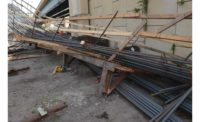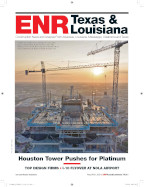Despite concerns raised by citizens groups about project funding and community impacts, the company developing a $2.3-billion Miami-to-Orlando passenger rail system is moving full speed ahead with its ambitious plans for the 235-mile-long line. Officials with All Aboard Florida (AAF)—a division of Florida East Coast Industries (FECI), Coral Gables—held its latest unveiling of design for its third south Florida station, in West Palm Beach, on July 21. In conjunction with the event, AAF tweeted this from President Michael Reininger: "All initial steps for our stations are now underway. This is now, in fact, happening."
According to AAF, construction related to the planned 66.5-mile Miami-to-West Palm Beach segment, where trains will reach speeds of 79 mph, will start later this year, as planned. The roughly $800-million south section, with stops in West Palm Beach, Fort Lauderdale and Miami, will require 60 miles of double-tracking work, as well as improvements to 10 fixed bridges and 183 grade crossings.
An initial "early works” contract should start in August. More significantly, All Aboard Florida says it is completing engineering for the south section’s rail infrastructure work, while simultaneously prequalifying and interviewing contractors for the single contract covering the "lion’s share" of the work, says Reininger. "We will have the conclusion of that contract and the work beginning by the end of the year," he says.
The group's high-profile design unveilings for its three South Florida stations generated the intended public fanfare. And on July 24, AAF announced the hiring of Suffolk Construction Co. as construction manager of its 3-million-sq-ft Miami station, valued at $150 million. Construction of the facility, which will feature a station elevated 50 ft, will start later this year, Reininger says.
Shortly thereafter, he adds, AAF will move forward on a design-build procurement process for the smaller Fort Lauderdale and West Palm Beach stations, which are collectively valued at $60 million.
However, the 168.5-mile north segment—connecting West Palm Beach and Orlando with no stops in between and where trains could hit 110 mph—has generated significant pushback. The FRA expects to issue a draft environmental impact statement for the north section soon.
The group Florida Not All Aboard has been one of the most vocal in raising concerns over public spending related to the project, which has been touted by AAF and state officials as being completely privately funded. However, as the group points out, AAF is applying for a roughly $1.5-billion Railroad Rehabilitation and Improvement Financing (RRIF) loan for the debt component of its project financing plan. Reininger says the government loan program lowers financing costs, thus enabling greater capital investment.
If approved, the roughly $1.5-billion loan would be the largest RRIF loan in the history of the program, which was established via the 1998 passage of a federal transportation act. According to FRA, the largest RRIF loan to date went to Amtrak, in 2011, and totaled $562.9 million. AAF says the project is not dependent on the RRIF loan.
Florida Not All Aboard's critics assert that the passenger rail line won't prove profitable, thus raising the notion that AAF could default on the loan, creating the potential for necessary government subsidies.
"Our concern is that this doesn’t turn into a Solyndra on rails," says Florida Not All Aboard founder K.C. Traylor.
AAF's Reininger adamantly dismisses both the notions of lax ridership and possible loan default. Citing the "many profitable, privately run intercity passenger rail systems" in the U.S. and abroad, he asserts that All Aboard Florida's passenger service will prove "highly profitable."
Critics' protestations that no public funding should be attached to the project have generated some apparent traction with state and local officials. For instance, after meeting with Florida Not All Aboard's founder in Tallahassee on July 14, Transportation Secretary Ananth Prasad wrote AAF, reiterating, "The department will not invest state dollars in your project."
That political sentiment could impact AAF's plans for its Miami station, where the company could accommodate a future Tri-Rail train service, known as Coastal Link, by building in the necessary infrastructure. According to AAF, incorporating the infrastructure for the state-funded Tri-Rail line would add about $44 million to the Miami station’s design and construction costs. The issue, asserts Reininger, is whether public officials will decide to approve such funding for the incremental additions to the Miami station. The only other option is for Tri-Rail to build its own station for the Coastal Link service, which he says would cost "orders of magnitude" more than AAF's $44-million estimate.
"We are working very hard to give the public entities as much time as possible to figure out the funding solution, but it's near term," he says. If the state or other public entities don’t provide the funding, he adds, "We will have to proceed without it … and that integration opportunity would be gone forever."
7/29/2014 - This story was updated with new information concering the announcement of a builder for All Aboard Florida's Miami station.








Post a comment to this article
Report Abusive Comment